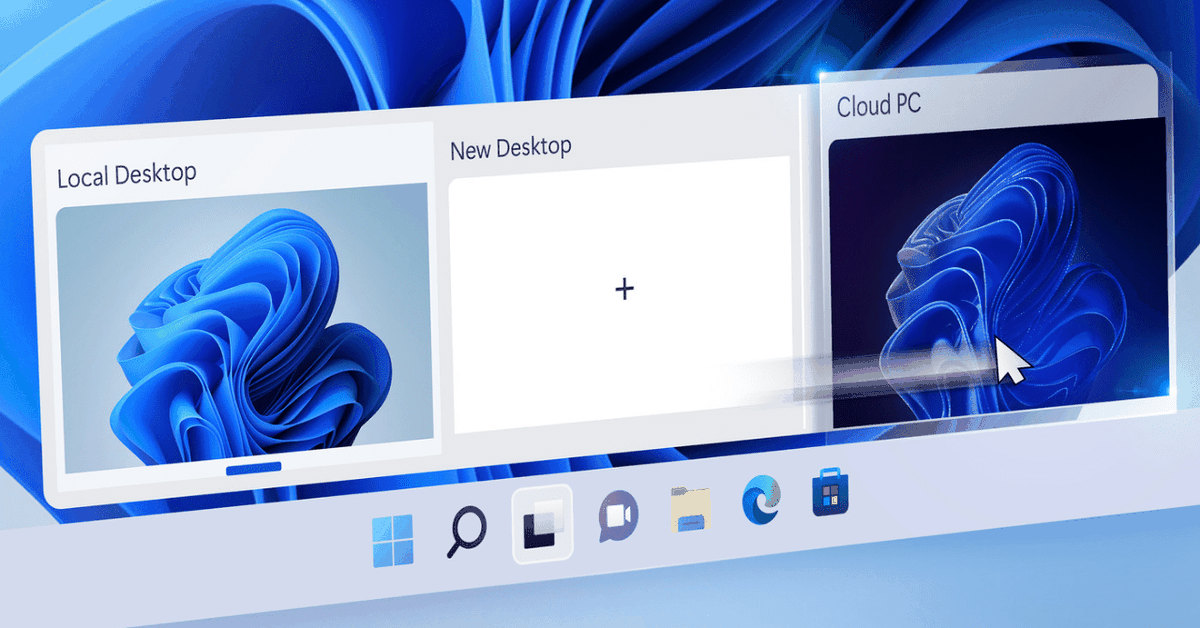I assume it is not a full transition to cloud, instead they are adding ‘Cloud Computing to Windows’ and integrating with system.
Wow great More always online drm in windows
Recently I moved to a Fedora distro called Nobara for my gaming rig. Microsoft has been working hard to force me out for years. When I have to make custom installers, and run scripts to control updates and telemetry, you’re not being a very inviting OS.
I would switch os if roblox didn’t decide to screw linux users with the byfron anti cheat
I’ve just been testing it out, but tried installing a couple of games through lutris and had no luck with it. Tinkering isn’t an issue, but the system hung so bad when starting Arcanum I had to reboot to get back in. Even after killing wine, the game and gnome-shell I still couldn’t interact with the gui at all.
@dvdnet90 I’m leaving windows as soon as support is dropped for windows 10
An OS as a service that you would connect to from… what ? Do they intend to sell computers that can do nothing else than running an RDP session ?
The Surface Duo and Duo 2 both start up an RDP session if you plug them into a keyboard and mouse, so it’s not unlikely
2023, the year that big tech shot it self in the face, continues.
Redmond locking out consumers with shitty/metered Internet connections? What a wonderful idea.
Asking people to move to a subscription model will also be appreciated, I’m sure.
Is the “cloud” sustainable and scalable, in terms of energy and environmental demands?
It’s probably better because you don’t waste that many hardware resources.
No, no – they want to get you to pay for your hardware, mandatory, big network transfers, and cloud resources. None of which are exactly powered by unicorn farts.
So if I don’t have an internet connection, I can’t even boot my computer?
Big “you’ll own nothing and be happy” energy.
So if I don’t have an internet connection, I can’t even boot my computer?
While I personally hate this Idea as well, I have to admit, that there could certainly be rather significant upsides for users.
Cheap Chromebook-like Laptops, but can run Video Games, Video Encodings, Finite Element Analyses, Computational Fluid Dynamics etc no problem. “Your” PC can be accessible from your phone in a Pinch.
You open a weird Link and got a Virus? No problem, just roll back your “PC”
Your home floods/burns down? All the images from your children are still safe.
Never being bothered by needing a hardware upgrade.Can’t afford your monthly windows cloud bill? Lose access to all your data, important files, pictures of your kids, music library.
Fuck everything about that with a rusty spoon.
Being able to run video games or other hardware intensive process would either require pricey hardware or they’d be streamed from a cloud service (which comes with a whole other bundle of issues to consider) as that computational power has to come from something physical somewhere. Offloading your OS to the cloud wouldn’t affect that. PCs can already be accessed by phone if you have the right set up (dedicated IP hosting and a VPN) As for saving data in case of emergencies, we already have cloud based storage solutions that wouldn’t be impacted by cloud based OS.
There is 0 reason to use a cloud based OS other than making sure people are tied to your service for the life of their computer. This feels like a solution to a problem no one has.
I believe the poster above you was referring to full cloud-hosted Virtual Desktops, not just cloud-hosted OS. The former would make a lot more sense and would indeed allow for need-based scaling of resources without any expensive local hardware. I think this is the future of the common man’s computing experience - a nice monitor that also functions as a thin client to access web-hosted virtual desktops.
Yup, that was what I understood it to be, I’ll admit to just skimming the article, but it seemed rather directly that?
Windows 365 is a service that streams a full version of Windows to devices. So far, it’s been limited to just commercial customers, but Microsoft has been deeply integrating it into Windows 11 already. A future update will include Windows 365 Boot, which will enable Windows 11 devices to log directly in to a Cloud PC instance at boot instead of the local version of Windows. Windows 365 Switch is also built into Windows 11 to integrate Cloud PCs into the Task View (virtual desktops) feature.
It’s the Adobe model though. It’ll seem attractive to start with compared to upgrading every few years, but soon enough you’ll be paying out the nose for it.
All for the low low price of…your freedom, privacy, security, and consumer rights.
MS can kiss my piss.
As long as it’s opt-in then there are also huge benefits. Updates would happen organically, less issues with driver support for your specific manufacturer, laptops would become even thinner and lighter, you could run windows on virtually (lol) anything and they could even sell tiered hardware so that you could game in the cloud (this tech is getting better and better). I love my Shadow PC for gaming and other nonsense, being able to play modern games with maxed out graphics on my fan-less MacBook Air is a dream.
I also work in IT and there are so many bullshit companies offering cloud based services that run specific software in the cloud, RightNetworks being one of them, but one thing I like is it’s almost completely hands off on my end and if the whole OS is running in the cloud then it would be cake for provisioning and remote management.
And if you try to use a browser other than Edge it’ll shoot your dog
I guess it’s about time to look into Linux again. I’ve run it on and off since the late 90’s, but always end up back on Windows because of games.
Almost all games are supported on Linux, with the exception of games with invasive anti-cheat, but those rootkits shouldn’t be installed on Windows either.
I wonder if they can be exploted by someone attacking your computer. How much do anti-cheat developers care about user’s security?
Not at all!
I know I’m one of the few, but what I like about a PC is the Computing part, but also the Personal part. I can use this apparatus to automate some calculations in my own free time and display it however I want. Sure things can be outsourced. Sure I can use a cloud computer. But that’s no fun for me.
I had notebooks where I turned off WiFi and all its services, I had a desktop PC where the network card fried. Those were the most stable and fastest Windows installations I ever had. Running for years on end without ever needing a reboot.
Windows Terminal-mode, it sure may have its place. But not for me.
What consumer is asking for this?
No consumer wants this. Microsoft wants this.
Exactly… I do use windows, but I if this becomes mandatory I will be 100% on Linux immediately.
Why does Microsoft want this? What’s the benefit of encouraging people to use VMs instead of running Windows locally?
Subscriptions! And “Don’t sell the bacon, sell the sizzle” You get to pay for every minute you use ‘your’ computer. If they do this I expect the hardware will be free, but you pay $32.50 a month for normal usage and $50.99 for any compute minutes requiring extra CPU or GPU (including ChatGPT or any AAA game). On the upside - perhaps there would be an easy way to switch between VMs and do multiple things at once. Also, your disk space is unlimited but priced per Gb.
I already have to jump through a bunch of hoops to make Win 10/11 tolerable for personal use and preferences Things like ShutUp10 and dozens of manual tweaks, registry settings, policy changes, etc. The cloud version will probably constantly roll all of that back on me.
I really hate this silicon valley mindset that everyone has reliable broadband and worse, they know what the user wants/needs better than the user does.
Enshitificstion is ruthless.
Linux welcomes you :)
I like Linux a lot, I just have never mastered it. I plan on learning it better when I retire.
The writing was on the wall considering how much they’re trying to push Bing into Windows 11. They want everything to be online and connected to their services, and it sucks.
man, this might be thing that finally makes me switch to Linux. what an incredibly stupid, shitty, and greedy decision.
Do it! Linux is great, and not nearly as hard as its reputation suggests.
Windows 10 not allowing you to postpone updates when it launched pissed me off enough to switch to linux for around 4 years. I came back for games, but the GPU market (and age) has pushed me back to consoles or just not gaming.
Check again Linux gaming, Proton/Wine is surprisingly viable now and the vast majority of games run without any issue.
And if you want to know, if a game works, check protondb.com . It’s for proton, so steam, and includes a steam deck section. And many games, that don’t have a native linux version, come with great tips on how to make them run, if a game does not run with proton out of the box. Most just need a different proton version, which is three clicks to change in steam.
I’ve heard Linux gaming is pretty good now with a native steam client and a ton of games that run natively thanks to steamOS
the ton of games doesn’t run natively, they run well, but through a translation layer (wine/proton)
To be exact it’s not a translation layer, but a reimplementation of the Windows APIs and ABIs on Linux.
That’s why there is no performance cost.
I tried this last year. VR support, even using Valve hardware with Valve’s official VR support for Linux, was not there. In SteamVR menus it was stuttering and mispredicting (everything looks shaky), and in the actual applications it was unstable. It seems like the VR devices work perfectly, but the software for rendering and presenting frames is proof of concept quality. That’s basically the primary purpose of this last Windows machine so I’m kind of stuck.
There’s an open source OpenXR implementation, but I heard it doesn’t support hotplugging, as in if any of your devices disconnect for any reason you need to restart everything.
I still game a little on PC, but tabletop gaming in-person with my friends is so much better. I highly recommend it if you’re burned out on the whole computer games things. Board games, card games, and pen-and-paper RPGs are a lot better now than they were years ago. There’s something for almost every taste.

























